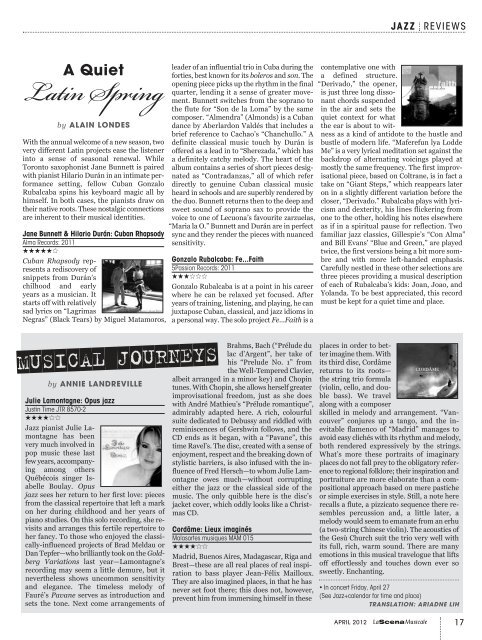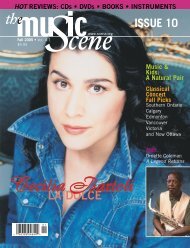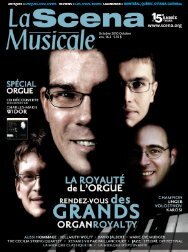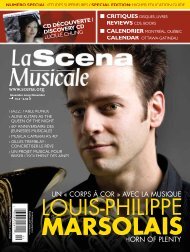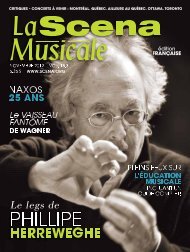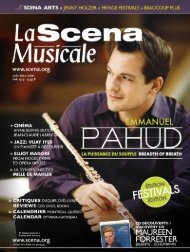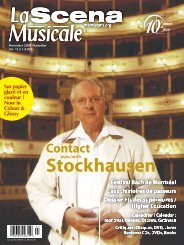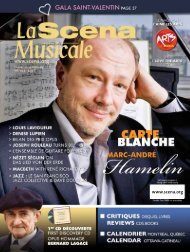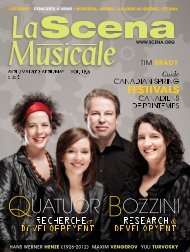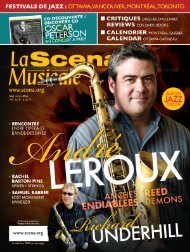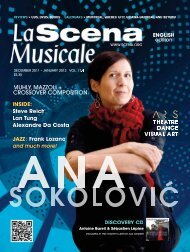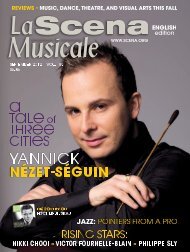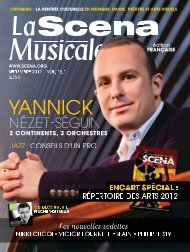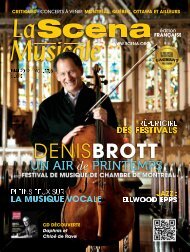The Bohlen-Pierce system - La Scena Musicale
The Bohlen-Pierce system - La Scena Musicale
The Bohlen-Pierce system - La Scena Musicale
Create successful ePaper yourself
Turn your PDF publications into a flip-book with our unique Google optimized e-Paper software.
JAZZ REVIEWS<br />
A Quiet<br />
<strong>La</strong>tin Spring<br />
by ALAIN LONDES<br />
With the annual welcome of a new season, two<br />
very different <strong>La</strong>tin projects ease the listener<br />
into a sense of seasonal renewal. While<br />
Toronto saxophonist Jane Bunnett is paired<br />
with pianist Hilario Durán in an intimate performance<br />
setting, fellow Cuban Gonzalo<br />
Rubalcaba spins his keyboard magic all by<br />
himself. In both cases, the pianists draw on<br />
their native roots. <strong>The</strong>se nostalgic connections<br />
are inherent to their musical identities.<br />
Jane Bunnett & Hilario Durán: Cuban Rhapsody<br />
Alma Records: 2011<br />
★★★★★✩<br />
Cuban Rhapsody represents<br />
a rediscovery of<br />
snippets from Durán’s<br />
chilhood and early<br />
years as a musician. It<br />
starts off with relatively<br />
sad lyrics on “<strong>La</strong>grimas<br />
Negras” (Black Tears) by Miguel Matamoros,<br />
MUSICAL JOURNEYS<br />
by ANNIE LANDREVILLE<br />
Julie <strong>La</strong>montagne: Opus jazz<br />
Justin Time JTR 8570-2<br />
★★★★✩✩<br />
Jazz pianist Julie <strong>La</strong>montagne<br />
has been<br />
very much involved in<br />
pop music these last<br />
few years, accompanying<br />
among others<br />
Québécois singer Isabelle<br />
Boulay. Opus<br />
jazz sees her return to her first love: pieces<br />
from the classical repertoire that left a mark<br />
on her during childhood and her years of<br />
piano studies. On this solo recording, she revisits<br />
and arranges this fertile repertoire to<br />
her fancy. To those who enjoyed the classically-influenced<br />
projects of Brad Meldau or<br />
Dan Tepfer—who brilliantly took on the Goldberg<br />
Variations last year—<strong>La</strong>montagne’s<br />
recording may seem a little demure, but it<br />
nevertheless shows uncommon sensitivity<br />
and elegance. <strong>The</strong> timeless melody of<br />
Fauré’s Pavane serves as introduction and<br />
sets the tone. Next come arrangements of<br />
leader of an influential trio in Cuba during the<br />
forties, best known for its boleros and son. <strong>The</strong><br />
opening piece picks up the rhythm in the final<br />
quarter, lending it a sense of greater movement.<br />
Bunnett switches from the soprano to<br />
the flute for “Son de la Loma” by the same<br />
composer. “Almendra” (Almonds) is a Cuban<br />
dance by Aberlardon Valdés that includes a<br />
brief reference to Cachao’s “Chanchullo.” A<br />
definite classical music touch by Durán is<br />
offered as a lead in to “Sherezada,” which has<br />
a definitely catchy melody. <strong>The</strong> heart of the<br />
album contains a series of short pieces designated<br />
as “Contradanzas,” all of which refer<br />
directly to genuine Cuban classical music<br />
heard in schools and are superbly rendered by<br />
the duo. Bunnett returns then to the deep and<br />
sweet sound of soprano sax to provide the<br />
voice to one of Lecuona’s favourite zarzuelas,<br />
“Maria la O.” Bunnett and Durán are in perfect<br />
sync and they render the pieces with nuanced<br />
sensitivity.<br />
Gonzalo Rubalcaba: Fe...Faith<br />
5Passion Records: 2011<br />
★★★✩✩✩<br />
Gonzalo Rubalcaba is at a point in his career<br />
where he can be relaxed yet focused. After<br />
years of training, listening, and playing, he can<br />
juxtapose Cuban, classical, and jazz idioms in<br />
a personal way. <strong>The</strong> solo project Fe...Faith is a<br />
Brahms, Bach (“Prélude du<br />
lac d’Argent”, her take of<br />
his “Prelude No. 1” from<br />
the Well-Tempered Clavier,<br />
albeit arranged in a minor key) and Chopin<br />
tunes. With Chopin, she allows herself greater<br />
improvisational freedom, just as she does<br />
with André Mathieu’s “Prélude romantique”,<br />
admirably adapted here. A rich, colourful<br />
suite dedicated to Debussy and riddled with<br />
reminiscences of Gershwin follows, and the<br />
CD ends as it began, with a “Pavane”, this<br />
time Ravel’s. <strong>The</strong> disc, created with a sense of<br />
enjoyment, respect and the breaking down of<br />
stylistic barriers, is also infused with the influence<br />
of Fred Hersch—to whom Julie <strong>La</strong>montagne<br />
owes much—without corrupting<br />
either the jazz or the classical side of the<br />
music. <strong>The</strong> only quibble here is the disc’s<br />
jacket cover, which oddly looks like a Christmas<br />
CD.<br />
Cordâme: Lieux imaginés<br />
Malasartes musiques MAM 015<br />
★★★★✩✩<br />
Madrid, Buenos Aires, Madagascar, Riga and<br />
Brest—these are all real places of real inspiration<br />
to bass player Jean-Félix Mailloux.<br />
<strong>The</strong>y are also imagined places, in that he has<br />
never set foot there; this does not, however,<br />
prevent him from immersing himself in these<br />
contemplative one with<br />
a defined structure.<br />
“Derivado,” the opener,<br />
is just three long dissonant<br />
chords suspended<br />
in the air and sets the<br />
quiet context for what<br />
the ear is about to witness<br />
as a kind of antidote to the hustle and<br />
bustle of modern life. “Maferefun lya Lodde<br />
Me” is a very lyrical meditation set against the<br />
backdrop of alternating voicings played at<br />
mostly the same frequency. <strong>The</strong> first improvisational<br />
piece, based on Coltrane, is in fact a<br />
take on “Giant Steps,” which reappears later<br />
on in a slightly different variation before the<br />
closer, “Derivado.” Rubalcaba plays with lyricism<br />
and dexterity, his lines flickering from<br />
one to the other, holding his notes elsewhere<br />
as if in a spiritual pause for reflection. Two<br />
familiar jazz classics, Gillespie’s “Con Alma”<br />
and Bill Evans’ “Blue and Green,” are played<br />
twice, the first versions being a bit more sombre<br />
and with more left-handed emphasis.<br />
Carefully nestled in these other selections are<br />
three pieces providing a musical description<br />
of each of Rubalcaba’s kids: Joan, Joao, and<br />
Yolanda. To be best appreciated, this record<br />
must be kept for a quiet time and place.<br />
places in order to better<br />
imagine them. With<br />
its third disc, Cordâme<br />
returns to its roots—<br />
the string trio formula<br />
(violin, cello, and double<br />
bass). We travel<br />
along with a composer<br />
skilled in melody and arrangement. “Vancouver”<br />
conjures up a tango, and the inevitable<br />
flamenco of “Madrid” manages to<br />
avoid easy clichés with its rhythm and melody,<br />
both rendered expressively by the strings.<br />
What’s more these portraits of imaginary<br />
places do not fall prey to the obligatory reference<br />
to regional folklore; their inspiration and<br />
portraiture are more elaborate than a compositional<br />
approach based on mere pastiche<br />
or simple exercises in style. Still, a note here<br />
recalls a flute, a pizzicato sequence there resembles<br />
percussion and, a little later, a<br />
melody would seem to emanate from an erhu<br />
(a two-string Chinese violin). <strong>The</strong> acoustics of<br />
the Gesù Church suit the trio very well with<br />
its full, rich, warm sound. <strong>The</strong>re are many<br />
emotions in this musical travelogue that lifts<br />
off effortlessly and touches down ever so<br />
sweetly. Enchanting.<br />
• In concert Friday, April 27<br />
(See Jazz+calendar for time and place)<br />
TRANSLATION: ARIADNE LIH<br />
APRIL 2012 17


